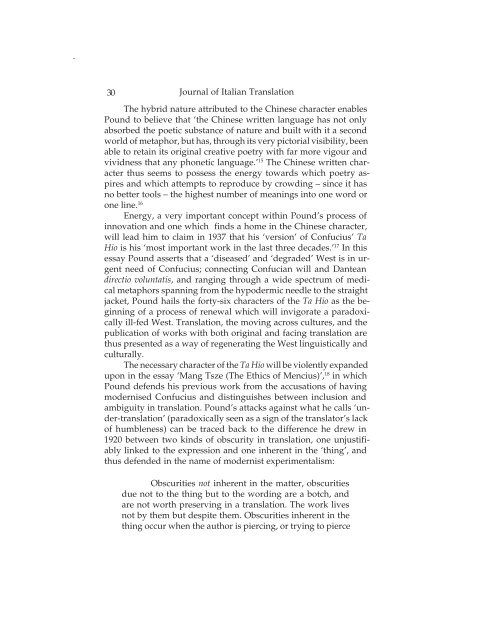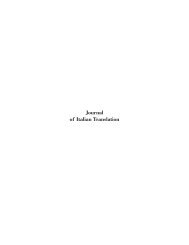Journal of Italian Translation
Journal of Italian Translation
Journal of Italian Translation
Create successful ePaper yourself
Turn your PDF publications into a flip-book with our unique Google optimized e-Paper software.
30 <strong>Journal</strong> <strong>of</strong> <strong>Italian</strong> <strong>Translation</strong><br />
The hybrid nature attributed to the Chinese character enables<br />
Pound to believe that ‘the Chinese written language has not only<br />
absorbed the poetic substance <strong>of</strong> nature and built with it a second<br />
world <strong>of</strong> metaphor, but has, through its very pictorial visibility, been<br />
able to retain its original creative poetry with far more vigour and<br />
vividness that any phonetic language.’ 15 The Chinese written character<br />
thus seems to possess the energy towards which poetry aspires<br />
and which attempts to reproduce by crowding – since it has<br />
no better tools – the highest number <strong>of</strong> meanings into one word or<br />
one line. 16<br />
Energy, a very important concept within Pound’s process <strong>of</strong><br />
innovation and one which finds a home in the Chinese character,<br />
will lead him to claim in 1937 that his ‘version’ <strong>of</strong> Confucius’ Ta<br />
Hio is his ‘most important work in the last three decades.’ 17 In this<br />
essay Pound asserts that a ‘diseased’ and ‘degraded’ West is in urgent<br />
need <strong>of</strong> Confucius; connecting Confucian will and Dantean<br />
directio voluntatis, and ranging through a wide spectrum <strong>of</strong> medical<br />
metaphors spanning from the hypodermic needle to the straight<br />
jacket, Pound hails the forty-six characters <strong>of</strong> the Ta Hio as the beginning<br />
<strong>of</strong> a process <strong>of</strong> renewal which will invigorate a paradoxically<br />
ill-fed West. <strong>Translation</strong>, the moving across cultures, and the<br />
publication <strong>of</strong> works with both original and facing translation are<br />
thus presented as a way <strong>of</strong> regenerating the West linguistically and<br />
culturally.<br />
The necessary character <strong>of</strong> the Ta Hio will be violently expanded<br />
upon in the essay ‘Mang Tsze (The Ethics <strong>of</strong> Mencius)’, 18 in which<br />
Pound defends his previous work from the accusations <strong>of</strong> having<br />
modernised Confucius and distinguishes between inclusion and<br />
ambiguity in translation. Pound’s attacks against what he calls ‘under-translation’<br />
(paradoxically seen as a sign <strong>of</strong> the translator’s lack<br />
<strong>of</strong> humbleness) can be traced back to the difference he drew in<br />
1920 between two kinds <strong>of</strong> obscurity in translation, one unjustifiably<br />
linked to the expression and one inherent in the ‘thing’, and<br />
thus defended in the name <strong>of</strong> modernist experimentalism:<br />
Obscurities not inherent in the matter, obscurities<br />
due not to the thing but to the wording are a botch, and<br />
are not worth preserving in a translation. The work lives<br />
not by them but despite them. Obscurities inherent in the<br />
thing occur when the author is piercing, or trying to pierce

















